Key takeaways:
- Ethical mentorship emphasizes trust, respect, and accountability, guiding individuals through moral dilemmas without providing direct answers.
- Pro-life advocacy centers on the dignity of human life, supporting women and families while promoting education to foster informed choices.
- Personal experiences and storytelling in advocacy can shift perspectives and highlight the complexities of choices faced by individuals.
- Effective mentoring involves establishing boundaries, practicing active listening, and engaging in self-reflection to enhance growth and understanding.
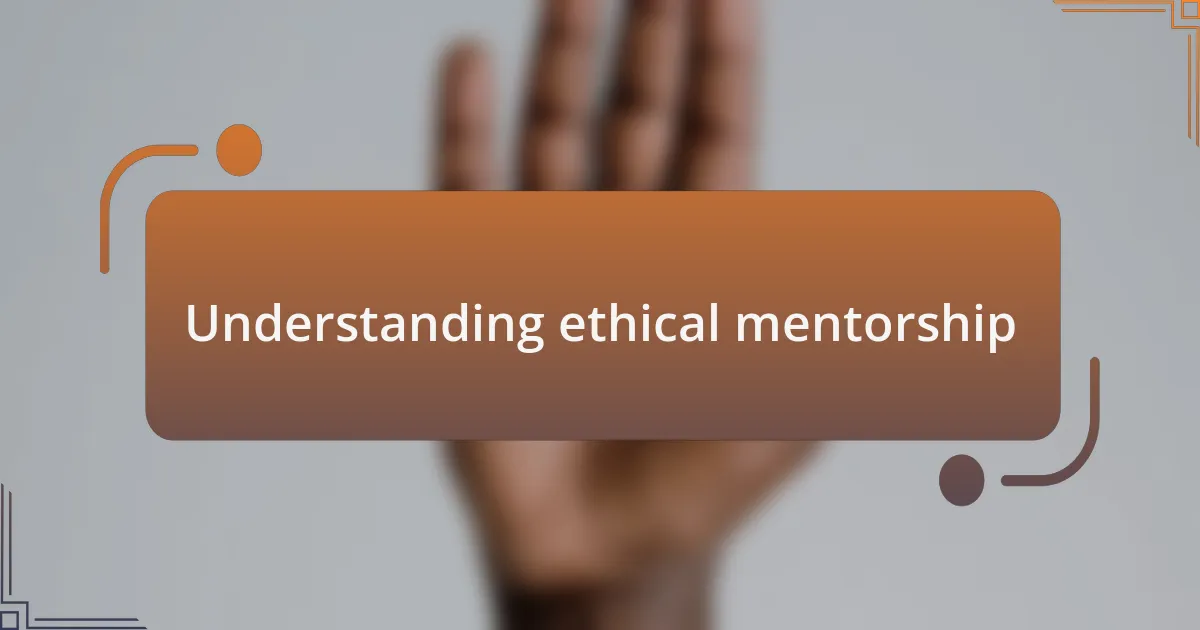
Understanding ethical mentorship
Ethical mentorship is not just about sharing knowledge; it’s about fostering a relationship grounded in trust and respect. I recall a time when I struggled with a moral dilemma in my advocacy work. My mentor didn’t give me direct answers but instead guided me with thoughtful questions that challenged my assumptions and encouraged deeper introspection. How often do we take the time to reflect on our values alongside someone who truly cares about our growth?
Establishing clear boundaries is another crucial aspect of ethical mentorship. There was a moment when I found myself leaning too much on my mentor for emotional support, which blurred those lines. That experience taught me the importance of mutual respect and understanding in a mentoring relationship, pushing me to seek balance and independence. Have you navigated similar waters in your own mentorship experiences?
At its core, ethical mentorship encourages accountability. I’ve learned that a mentor’s role isn’t just to uplift but also to hold you to your commitments and aspirations. Reflecting on past interactions, I’ve felt a deep sense of gratitude for mentors who dared to challenge me, urging me to strive for something greater. This balance of support and challenge is essential in ethical mentorship, wouldn’t you agree?
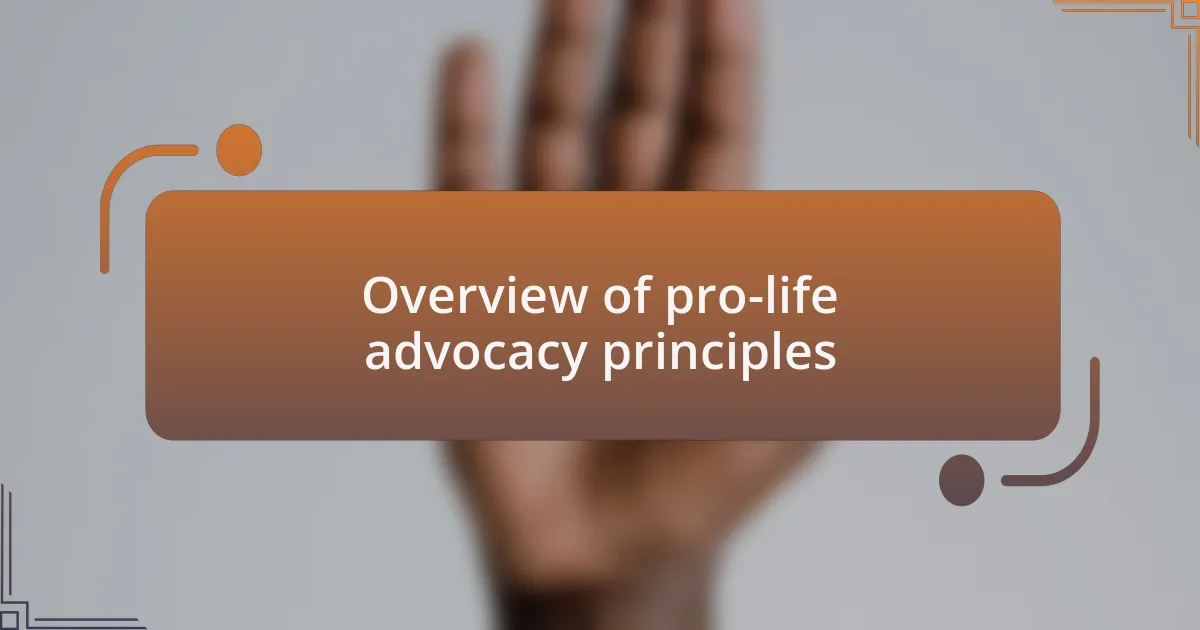
Overview of pro-life advocacy principles
The principles of pro-life advocacy are rooted in the belief in the inherent dignity and value of every human life, from conception until natural death. I remember my first encounter with individuals who held passionately different views. It was eye-opening and made me profoundly appreciate the importance of empathy in our discussions. How do we bridge the divides when our beliefs about life’s sanctity differ so widely?
Central to pro-life advocacy is the commitment to supporting women and families. This means not only opposing abortion but also providing resources and care to those facing unexpected pregnancies. I learned firsthand the impact of offering tangible support, like counseling and material assistance, which can be life-changing for individuals in these situations. Have you ever considered the power of community support in changing hearts and minds?
Another essential principle is the emphasis on education. By informing others about the biological realities of human development, we can foster informed choices. I recall hosting a workshop that highlighted the stages of fetal growth, which transformed how attendees viewed the issue. It’s fascinating to see how education can shift perspectives, isn’t it? This approach not only conveys our views but also encourages thoughtful dialogue on such a sensitive topic.
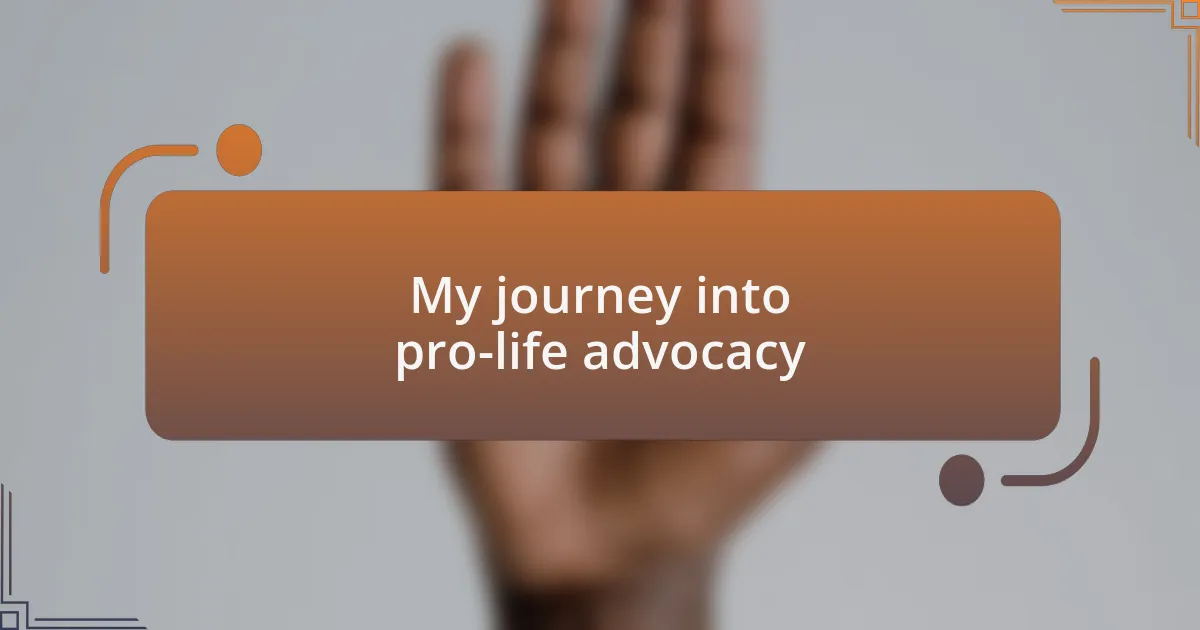
My journey into pro-life advocacy
My journey into pro-life advocacy began unexpectedly during a college debate. I initially joined to argue for pro-choice, but as I listened to passionate stories about lives transformed by unexpected pregnancies, my perspective began to shift. What if those stories were more than just statistics? They were real people whose experiences challenged my assumptions.
As I delved deeper into the community, I found myself volunteering at a local pregnancy resource center. I vividly remember a young woman who walked through our doors, scared and unsure. By providing her with support—from counseling to baby supplies—I witnessed the profound impact our efforts could have on someone’s life. Isn’t it incredible how a little support can ignite hope?
The more I engaged with others in the movement, the more I realized that advocacy isn’t just about opposing abortion; it’s about telling the stories that often go unheard. I’ve shared coffee and conversations with mothers who have chosen life amidst challenges, and I can tell you, these connections fuel my drive. How often do we overlook the power of personal stories in advocating for change?
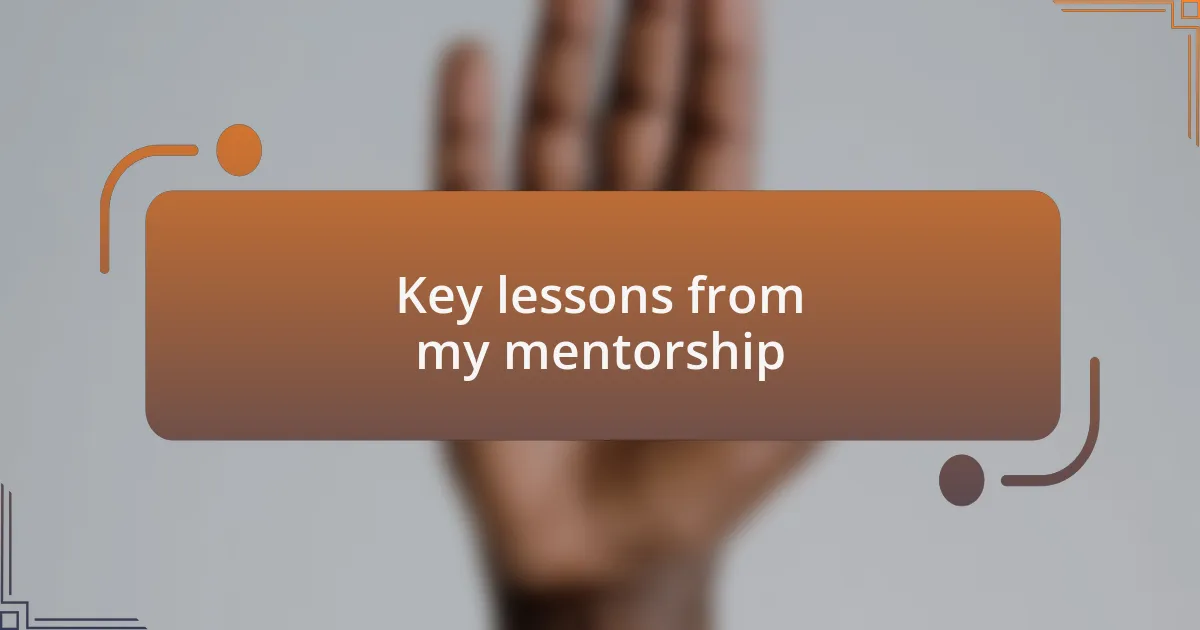
Key lessons from my mentorship
Throughout my mentorship journey, one key lesson emerged: empathy is crucial. I remember sitting with a mentor who emphasized the importance of truly listening to those with opposing views. Engaging in these conversations challenged me to understand the experiences that shape beliefs, ultimately helping me strengthen my own. Have you ever found that stepping into someone else’s shoes can illuminate the path forward?
I also learned the power of collaboration. My mentor often brought together individuals from diverse backgrounds—activists, medical professionals, and even those who had once contemplated abortion. I recall a particularly enlightening group discussion where differing perspectives sparked a constructive dialogue. That moment demonstrated how unity in our cause can arise from respecting differences, don’t you think?
Lastly, my experiences taught me that mentorship is a two-way street. One day, I was sharing insights with a new volunteer when she surprised me with a fresh viewpoint on our mission. I realized then that mentorship extends beyond guidance; it flourishes through mutual learning. Isn’t it fascinating how sometimes the most impactful insights come from those we least expect?
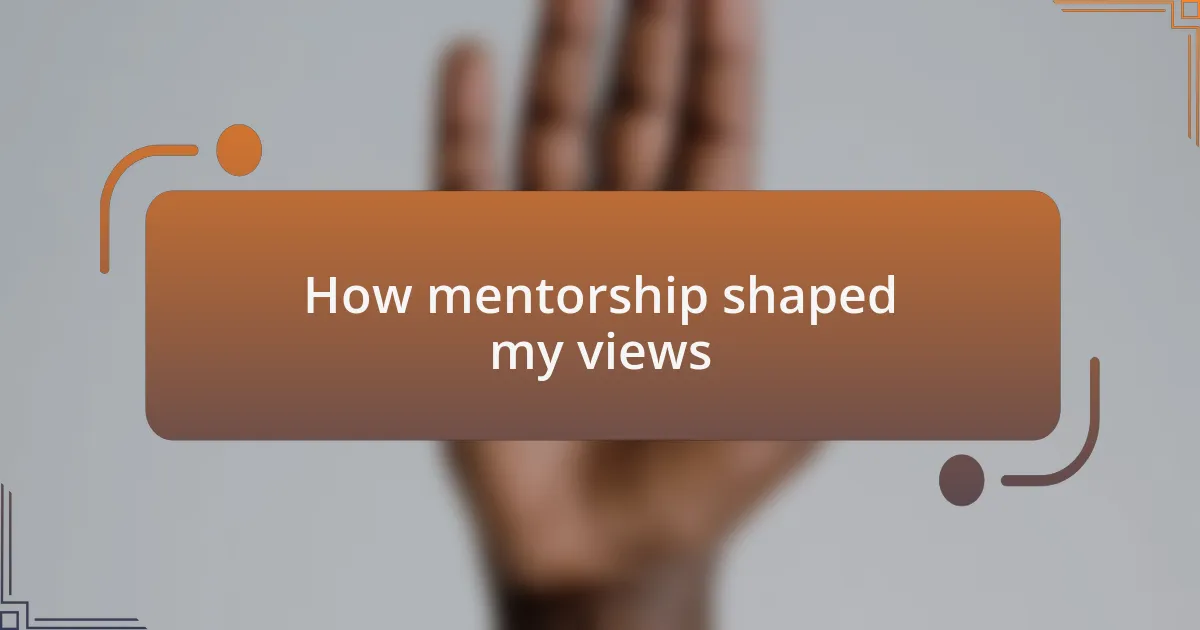
How mentorship shaped my views
How mentorship shaped my views
While working closely with my mentor, I found my perceptions of life and choice significantly shifted. I distinctly remember a moment during our discussions when I realized that the narratives we hear about abortion are often oversimplified. By sharing stories of women who faced complex, heart-wrenching decisions, my mentor illuminated the depth of their experiences. Have you ever felt a profound connection to a story that changed how you viewed a whole issue?
Another pivotal experience came when my mentor introduced me to ethical debates surrounding pro-life advocacy. These discussions prompted me to really consider the nuances of morality within our cause. I felt a mix of emotions—hesitation at first, but ultimately a strong urge to advocate for life with compassion. Don’t you think that grappling with such complexities can lead us to a deeper understanding of our mission?
Mentorship also pushed me to question my own biases. During one reflective session, I confronted my preconceived notions about individuals affected by abortion. My mentor guided me to appreciate the value of understanding everyone’s story, which undeniably transformed my advocacy approach. How often have we missed the opportunity to grow simply because we were too comfortable in our beliefs?
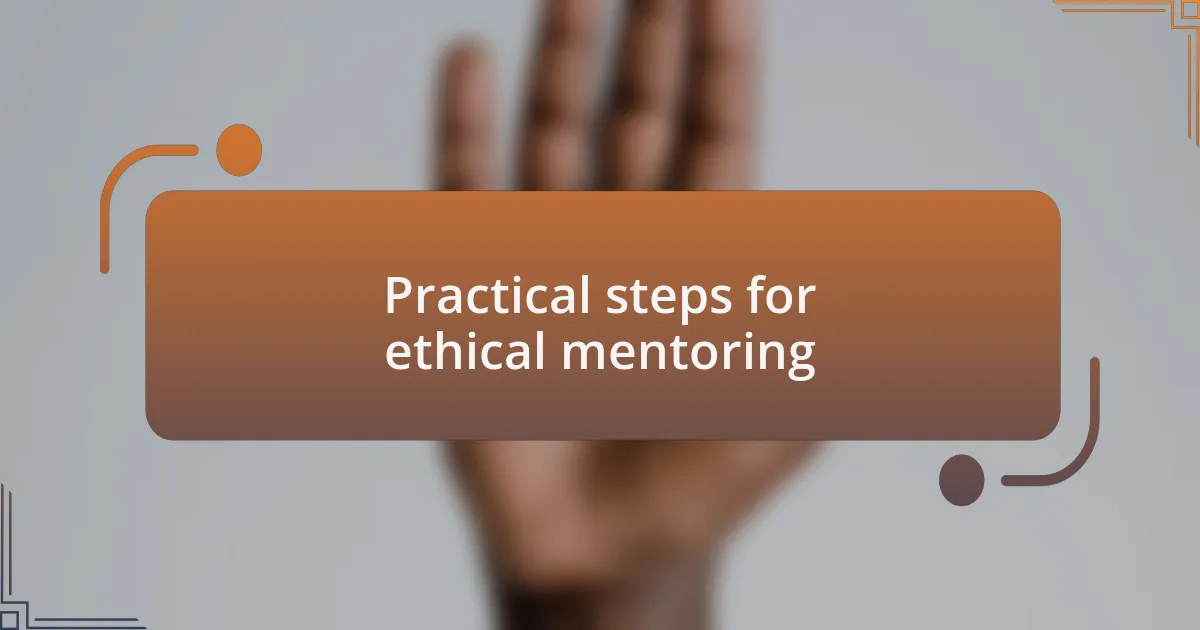
Practical steps for ethical mentoring
When embarking on an ethical mentoring journey, it’s crucial to establish clear boundaries and expectations from the get-go. I learned this the hard way during my early mentorship experience, where I jumped right in, only to feel overwhelmed by the intensity of the discussions. Have you ever found yourself in a situation where you wished you had communicated more openly about your comfort levels? Setting these boundaries not only fosters trust but also ensures that both mentor and mentee can navigate complex topics with respect.
Another vital step is to practice active listening, which I’ve found can be transformative in mentorship. I recall a session where my mentor patiently listened as I shared my concerns about advocating for life. Instead of jumping in with opinions, they reflected my feelings back to me, which made me feel heard and understood. Have you ever felt the power of being truly listened to? This technique can unveil deeper insights and pave the way for more meaningful discussions.
Finally, I believe that ongoing self-reflection is essential for ethical mentoring. After each session, I would take a moment to jot down my thoughts and feelings about the discussions. This practice helped me identify my biases and growth areas. Have you ever taken a step back to really assess your perspectives? Engaging in self-reflection allows us to evolve continuously, ensuring our advocacy becomes richer and more compassionate over time.